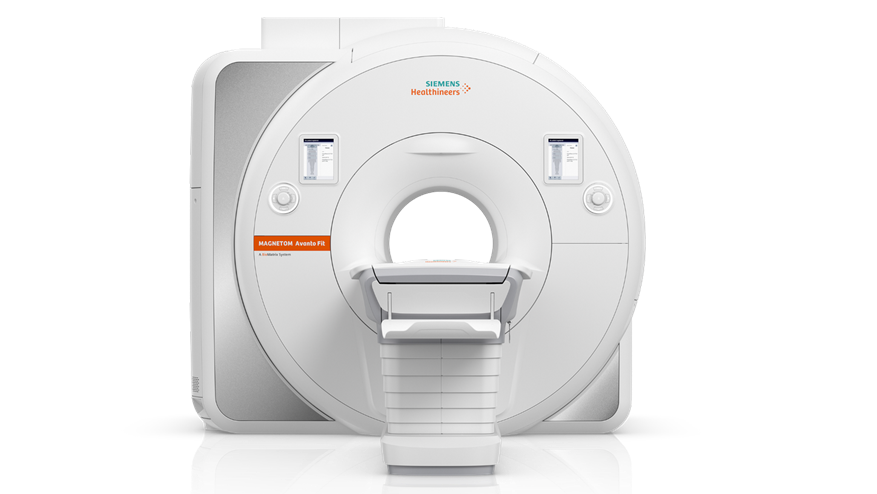Magnetic Resonance Imaging (MRI)
Magnetic Resonance Imaging (MRI) is a highly advanced technology that uses a sophisticated computer, radio waves and a strong magnetic field to produce very detailed images of the internal structures of your body. MRI does not use ionizing radiation, and is therefore considered to be safe with no known side effects or health risks.
MRI is commonly requested to help visualize the brain, central nervous system and spine, soft tissues and joints, blood vessels and organs of the chest, abdomen and pelvis. MRI can detect tumors, cysts, disease of the arterial and venous systems, soft tissue tears and many other anomalies.
Key MRI Information: What You Need to Know
-
Types of MRI Exams
Be sure to bring a list of current medications to your MRI exam. During your MRI, there will be up to two technologists assisting you. Your comfort is important to us. Please tell your technologist how to best help you to get on and off the table. You will be lying on your back or stomach and you will be positioned in one of three ways:
- Feet First Studies
(Knees, Upper or Lower Legs, Ankles, Feet)
During feet first exams, your head will be out of or at the opening of the MRI machine.
- Head First Studies
(Brain, Cervical/Neck, Chest, Thoracic Spine/Lumbar Spine*/Shoulder/Humerus, Abdomen/Pelvis, Elbows, Wrists and Hands)
During head first exams, your head will be in the middle, center of the machine.
Please Note: NPO (Nothing By Mouth) will be required for abdomen exams 4-6 hours prior to your MRI exam. - Breast Studies
You will be lying on your stomach for the MRI exam which takes 25 minutes.
*Some body parts can be manipulated to be scanned feet first. This may result in longer scan times. - Feet First Studies
-
How to Prepare
You must change your clothes to remove anything with metal snaps or zippers. If you wish, you may wear your own metal-free clothing, such as a sweat suit. Otherwise, you will change into a patient gown. You must also remove anything else that may contain metal, such as jewelry, hairpins, hearing aids and dental work. Continue with your usual diet and medication unless your doctor has instructed you to do otherwise.
*Please Note: NPO (Nothing By Mouth) will be needed for abdomen exams.
-
The Procedure
The technologist will position you on a padded table that will slide into the scanner. An additional device may be placed around the area of the body to be examined. In some cases contrast agents are injected into your veins to enhance the appearance of certain tissues or blood vessels in the images. It is important that you remain as still as possible during the exam—in some cases you may be asked to hold your breath—so the images will not be blurred. However, you should relax and breathe normally.
We want to make your experience as comfortable as possible. A special headset and podcasts/music may be used and listend to during patient exams.
During the exam, you will hear rhythmic knocking sounds as the scanner works. The technologist will control the exam from another room, but will be able to monitor you at all times. You can talk with him or her by intercom. The procedure usually takes between 30 and 60 minutes. Please note that you will be in an enclosed space during that time and we do not dispense medicine to MRI patients. If you think you may be claustrophobic, contact your referring physician for further instructions. -
Possible Risks
Magnetic fields can be used repeatedly without known risks and are considered safer than other diagnostic procedures that expose the patient to radiation. Each patient will be screened prior to his or her MRI exam. Certain medical implants are not compatible within the MRI unit. Examples include:
- A pacemaker
- Aneurysm clips
- Metallic fragments in the eye or other body parts
- A spinal cord stimulator
- A cochlear implant
- Continuous glucose monitoring devices
Please notify the technologist if you have any of the above items, any implants, if you are pregnant, breastfeeding or have an IUD or prosthetic device. A blood test to measure kidney function may be required prior to the exam. Your healthcare provider will notify you if this is necessary.
-
Questions & Contact
For more information about MRI services at Wilson Health, please call (937) 498-5336.
We are happy to assist you with any questions and help you have the best patient experience at Wilson Health!

